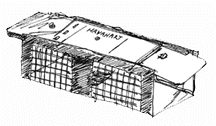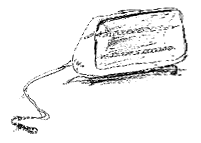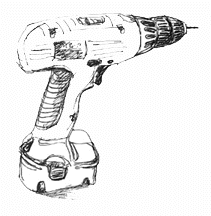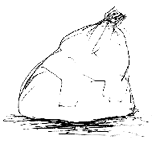Stella picked up the copy of Notes from the Underground she had bought that morning from the dusty bookstall. She had missed out on Dostoevskii in adolescence. Today his reputation for gloom and doom, madness and filth, appealed to her. Her current mood called for reading a nineteenth century Russian novel and laughing at the picture she made, reading it. She would not read it all the way through of course. All she hoped for was the bitter taste of second-hand alienation. Not as fantasy or escape, more to remind herself that she was miserable, stuck in a foul reality of her own making.
"What a selfish person," she thought.
"I do not care about anyone or anything."
"No one can save me because I don’t care. And there is no such thing as caring."
She continued relentlessly in this vein, enjoying the logic she wove in her pseudo-introspection. |
|
|
| |
| |
|
Stella lay on a mouse-eaten mattress on the cellar floor. The mice were becoming a problem. She had laid traps for them. The newest "Havahart" trap was an aluminum cage device, big enough to catch a whole family. It had an elaborate system of springs which had more than once snapped the door on her fingers as she set the trap. The other so-called "conference" traps were set throughout the basement. So far they remained empty. |
 |
| The basement was damp and labyrinthine, dim and full of unresolved architectural detail. Its baseness appealed to her desire to indulge the bohemian self, to live the myth of the underground. She knew that she was an image of an image of an artist. Others still pursued this image unwittingly, unaware of its inherent contradictions. Maybe they were genuinely seeking an alternative life in a lifestyle. She knew, as any true artist (haha) should , that ‘alternative’ was a lie, a special media lie which everyone clung to. They all relied on it. But it wouldn’t save them in the end. How ridiculous they all were! Private views. Private functions, private games. She loved them, she would drink and insult everyone. And they loved it too. If she had been consistent, it would have worked. She could have enjoyed the lie too. But she didn’t want to represent anyone or anything. She couldn’t even represent herself. So why represent their idea of an artist? And anyway the idea of the artist as unique visionary being was absurd in the circumstances. For all of them, now more than ever. It always was of course, but now it was even uglier. She was unique, yes. And she knew how completely insignificant her uniqueness was. So she could let herself wallow in it. |
|
|
| |
| |
|
Who was she to call their bluff on the “myth of the artist”? They’d find out soon enough how wrong they were. Or maybe they wouldn’t. The cover-up was so effective. Everyone needed it. So convenient. But ugly. She knew what she was doing. It was all entirely premeditated - except when she decided not to premeditate, to throw them. And they thought they knew what she was about.
“A loner,” they’d say.
“A radical new enactment of the old ‘life as art’ adage.”
Or her enemies, “A megalomaniac in her hideaway cellar. A failure.”
Ha, they came so close to the truth, for all the wrong reasons. But she wasn’t a failure, yet. She still had her master-plan. |
| |
| In the meantime, she pandered to this absurd taste in Bohemia in her damp basement. To keep sane and not suffer too much, she cheated. In any case a sense of achievement resulting from self-imposed deprivation in pursuit of a ‘noble purpose’ would have made her lazy. She came out of hiding and allowed old friends to cook her meals and run hot baths - so she could wash off the dust and smell and cold sweat. She had the last laugh at the believers. |
|
|
| |
| |
|
None of them realized because they were too entranced by the rules of society, by extremes of work and leisure, that they were doomed. They had got it all wrong. She knew what to do. They didn’t. It was as simple as that. She was about to build her “Crystal Palace”, her kingdom, while they had no idea where to even start. She knew what to do and was just biding her time. |
 |
| Michael wanted to visit her. He always pestered her about it, trying to pin her down to a time. But her time was her own, no one else’s and she wasn’t having some annoying writer come bother her with questions. At first he seemed quite charming, he smiled often and always remembered her name. But he completely misunderstood what was going on. It wasn’t a stand against society, her living in the cellar. It didn’t bother anyone; and it was too late to ‘make a stand’ against society anyway. And in any case she wasn’t living in the cellar properly. It was her headquarters - her Underground where she contemplated world domination. Not in a stupid sci-fi, or millennial second coming sort of way. World domination was the concrete expression of where she was going. |
|
|
| |
| |
|
She filled the trap with honey and a lidful of milk. She then drank the rest of her bottle. She felt warmer but sick and incoherent. Dostoevskii’s Notes had fallen into a puddle. The mouse she wanted was warming its side next to the electric fire hazard. It turned around and warmed the other side. The honey and milk were ignored. Stella lay dozing, mouth furry and head spinning. She listened to a drip and the mouse scratching itself. |
| |
| The next day Stella dug a hole. She dug through the cellar floor. She used a Bosch electric drill to crack the stone slabs, and levered them out with chisels and a shovel. Then she dug straight down. She decided to go deep first, before broadening out the tunnel. She avoided bursting water or sewage pipes. There was still a good deal of water seeping into the cellar. She spent several weeks at this work, and didn’t tell anyone about it. She didn’t want any meddling. It was clear that something was up however because she was always very dirty, and she wouldn’t talk much. Her earlier zeal was replaced by silence - sometimes surly, sometimes excited as though it was all she could do to keep her story to herself. The writer Michael had given up on her. She was too difficult. Her unpredictability had attracted him, and her extreme politeness had puzzled him, because it seemed so at odds with her proclaimed misanthropy. But he had other fields to plow, and anyway recently Stella had become really too dirty and smelly to spend time with. |
|
|
 |
| |
|
Stella spent more and more time in her cellar, which was growing daily. Some days she would clear up to 6 or 7 cubic meters. Other days, she would be tangled up in pipes and only manage to dig a handful of dirt away. What happened to all the earth that she dug up? Fortunately for Stella, her cellar was in a large derelict building, with a small backyard which nobody ever visited. So she filled up a heavy duty refuse sac with dirt and dumped it on the first floor of the building. Soon she realized that this would not work as the weight of the dirt would eventually pull the building down, so she left her dirt in the yard, spreading it evenly so as not to draw too much attention to it if anyone were to come by. |
 |
| After several weeks the earth in the yard reached the bottom of the ground floor windows. Stella kept on digging. Her cellar was quite spacious by this time. It had a high ceiling where once it had been cramped and squat. The floor was very uneven of course. It was really a pit; deepest in the middle and shallower at the sides. By now all the pipes had been uncovered, and Stella kept on digging beneath them. She propped the pipes up against the sides of the cellar with steel rods and broomsticks, and anything else she could salvage from building sites and skips. She dug down deeper and deeper. The rubble and dirt beneath the stone slabs gave way four meters down to sand and then to clay. Above the clay was quite wet, so she drained the area using a pump and hose through to the backyard. It was softer and easier digging the clay, and quite pleasant. By now her hands were callused and strong, so she took out the clay quite rapidly. It was soft and warmer underfoot, so she removed her trainers and walked barefoot. There was a lot of clay, it seemed endless. She used some of it to strengthen the cellar walls, fearing that they might cave in, and every so often she would stick in a long plank to prop up the walls. The cellar was now twenty meters deep. It was like an inverted tower, growing ever longer, deeper into the earth. Stella decided it was time to broaden the tower to make it more like an inverted dome. She marked out the pillars which were weight bearing, and dug around them, slowly knocking away useless walls in her way. She soon realized however that it couldn’t be a perfect dome because she had to leave some of the walls to hold the weight of the building. It was becoming more like a series of deep towers with doors linking them, at different levels. It took her longer to dig the adjacent towers, because her experience made her more careful and aware of the need for sound engineering. She had one or two accidents, such as the time when a lot of clay which she had daubed on a wall came tumbling down on her. Fortunately she was wearing a bicycle helmet, so wasn’t hurt. Though the helmet was finished. Another time, a water pipe fell from its perch and flooded the clay floor. But she managed to stop the leak and actually quite enjoyed the wet clay for a day. The backyard was full of earth almost to the top of the roof. |
|
|
| |
| |
|
One day, Stella finished digging. She had dug as far as she wanted to. The ‘towers’ were twenty five meters deep, with dome-like floors, of baked clay. Stella had blowtorched them to harden them. She had dug so deep as to reach the metamorphic layers beneath the clay, and knew that she couldn’t dig any further. She stayed sleeping in her first tower for three days, she was so exhausted. When she woke up, she went to get some food and clean herself up. She was very hungry. The daylight hit her in the face like lightning. She’d been underground so long that she felt quite unsteady. The buildings were naked somehow, and upside down. The streets were strangely horizontal, whereas she was used to climbing between different levels and holding on to walls. The May sunlight was dazzling and came from all sides, not just from a distant doorway or a neon tube. Stella couldn’t think where to get food. She had no money on her, or anywhere else either. She went to a local cafe and asked if she could have breakfast on credit. They were not convinced, but felt sorry for her, and slightly scared that she might do something crazy, so they showed her a corner table, far away from the other customers, and gave her eggs, tea and toast. After breakfast she returned to the building with her cellar. It had signs hanging outside which she hadn’t noticed before, saying ‘Condemned, Keep out’, ‘For Sale’, and ‘Ideal for Redevelopment’. Stella scurried past, and crawled in the window she had kept open. She decided to give her handiwork some light. So, she smashed through rotting floorboards on each floor. She smashed windows, and let the light stream through and down to her towers. She climbed up onto the roof and peeled off the felt strips which came away quite easily. The polished underground pipes glinted far away in the sunlight, the warm clay glowed, and the splintered glass sparkled. |
| |
text © 2001 by ruth maclennan, used with permission
Ruth Maclennan is an artist and writer living in London.
|
|
|
|
